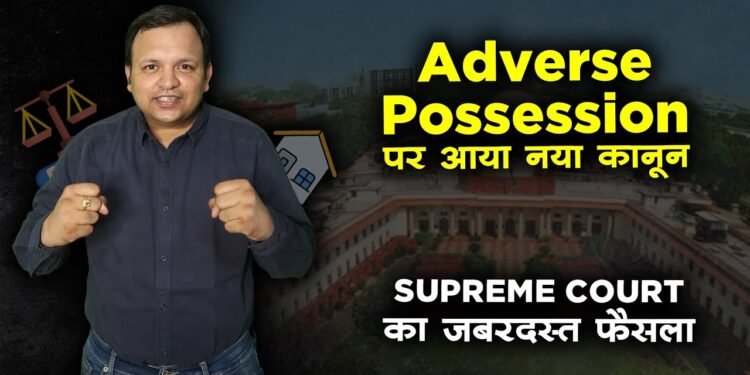Introduction:
“Adverse possession” is a legal doctrine in which a non-owner, often referred to as a stranger, becomes the occupant of a piece of land. Over time, the title or ownership of that land may transfer to them.
Land has always played a significant role in people’s lives in various ways. But what happens when it falls into the possession of a stranger? And if it remains in their control, how can one file a suit to reclaim it, and on what grounds? If you’re seeking answers to these questions, you’ve come to the right place to gain a comprehensive understanding of adverse possession with the help of a Landmark Judgement.
Landmark Judgement of Government of Kerala v. Joseph (9 August 2023)
Brief Facts of the case:
In this case, an individual named Joseph claimed that since 1940, he had occupied land owned by the Kerala government. Tragically, Joseph passed away, and his legal representatives sought possession of the land. In 1982, the tehsildar, the revenue officer of the Kerala government, issued a notice to Joseph’s legal representatives, asserting that their claim to the land was illegal as it was government-owned.
In response, the legal representatives filed a civil suit for injunction in the civil court, claiming that they had held possession of the land for a significant period. Ultimately, the court ruled in favour of Joseph’s family.
In response to this decision, the Kerala government filed its first appeal in the High Court, which ruled in favour of the government. In a subsequent turn of events, the legal representatives of Joseph filed a second appeal in the High Court, which was decided in their favour.
Following the succession of Joseph’s family in the second appeal in the High Court, the Kerala government brought the case to the Supreme Court on the grounds that, due to the land being government-owned, the concept of adverse possession should not apply. The High Court should also determine whether there was actual possession of the land, as the tehsildar’s reports indicated possession for up to 15 years.
In contrast, Joseph’s legal representatives asserted that they had possessed the land for more than 15 years.
Final Judgement:
The Supreme Court, after hearing both the respondent and petitioner, arrived at a judgement based on three critical points:
- Continuity: The Court emphasised that for adverse possession to be established, there must be continuity in the possession. In this case, Joseph’s legal representatives had not provided any conclusive evidence of their possession of the land since the 1940s, and they lacked physical documents regarding the land. They argued that the trees they had grown served as evidence of their possession. However, the Court rejected this argument, stating that the age of the trees could not be the sole basis for claiming adverse possession.
2. Law of Pleadings:The Court stressed that grounds not raised earlier cannot be introduced later. In this case, the legal representatives of Joseph had not raised the grounds of adverse possession when they received the tehsildar’s notice in 1982, and as such, this ground was not admissible, in line with the concept of the law of pleadings.
3. Burden of Proof: Referring to the landmark judgement in the case of State of Rajasthan v. Harpool Singh (2000), the Court emphasized that when government land is in question, the court must exercise vigilance and due diligence in assessing claims of adverse possession. As Joseph’s occupation was on government land, the High Court was deemed to have erred by not thoroughly examining the existence of adverse possession.
After considering these factors, the Supreme Court ruled in favor of the Kerala government, rejecting the plea of Joseph’s family due to insufficient evidence.
Conclusion:
This case revolves around the intricate concept of adverse possession and serves as a vital reminder of the legal principles surrounding land ownership and possession. Adverse possession cases necessitate careful scrutiny of the evidence and adherence to the principles established by the courts. In this instance, the Kerala government’s claim prevailed due to a lack of substantial evidence in favor of Joseph’s family.
For understanding more such complex law in simple ways, stay connected with www.thelegalshots.com .
If doubts still persist, contact our Legal Experts athttps://thelegalshots.com/legal-opinion/




